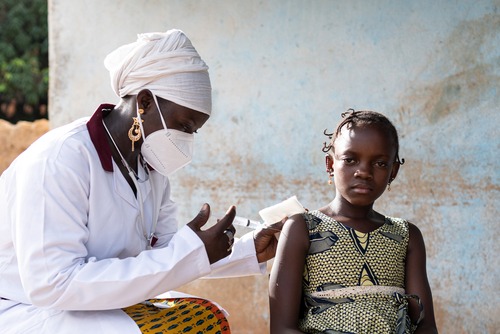
A growing, immediate need exists to accelerate global coronavirus vaccination efforts to help ensure America’s continued economic recovery, experts testified during a Dec. 14 hearing held by the House Select Subcommittee on the Coronavirus Crisis.
To date, nearly eight billion coronavirus vaccine doses have been administered worldwide, but inequities persist in vaccine distribution, according to information provided by the subcommittee, which says the majority of these vaccines have been administered in high- and upper-middle-income countries.
Comparatively, low-income countries — most of which are in Africa and the Middle East — have received less than one percent of these shots, the subcommittee reports.
“The inequitable access to coronavirus vaccines is causing unnecessary death and suffering, and we have a moral obligation to save lives by expanding vaccine access,” said U.S. Rep. James Clyburn (D-SC), subcommittee chairman. “But ensuring that vaccines are available around the world is not just the right thing to do — it is necessary to protect our own health and our economy.”
During his opening statement at the hearing, entitled “A Global Crisis Needs a Global Solution: The Urgent Need to Accelerate Vaccinations Around the World,” Clyburn said nearly 40 percent of people around the world have not yet received a single dose of a coronavirus vaccine.
“That’s three billion people who remain at far higher risk than they should be,” said the congressman. “Some of these three billion are those who have been unwilling to get the vaccine. Many others who remain unvaccinated, however, have been among those who have been unable to get the vaccine because it is unavailable in the countries where they live.”
Experts testified that inconsistent global vaccination rates have led to the persistent spread of COVID-19, putting Americans and others around the world at continued risk.
For instance, Dr. Ali Khan, dean of the College of Public Health and professor in the Department of Epidemiology at the University of Nebraska Medical Center, said the importance of boosting global vaccination efforts cannot be understated.
Protect everyone, said Khan, or “otherwise, we will continue to have new variants emerge and make their way onto our shores and force us into another cycle of aggressive prevention strategies.”
A global vaccination campaign layered with other public health measures, such as testing and treatment, would help reduce the risk for the occurrence of another variant like Delta and Omicron, Khan added.
Dr. Krishna Udayakumar, associate director for innovation at the Duke Global Health Institute and associate professor of global health and medicine at the Duke University School of Medicine, also advocated for ensuring a global response.
“If we want to protect Americans and go into this post-pandemic phase, we need to get everybody vaccinated as fast as possible,” said Udayakumar, who is also director of the Duke Global Health Innovation Center. “And everything we do to increase that speed will increase our transition to post-pandemic and move us back to a better new normal.”
And as more people are vaccinated around the world, the better off the American economy will be, experts testified.
“Our research shows that vaccinating the other nations is not an act of charity but an act of economic rationality, with a high return on investing in global vaccinations,” testified Sebnem Kalemli-Ozcan, an economics professor at the University of Maryland.
Even if the United States by itself was to fund efforts to close the global vaccination gap, there would be “a return on investment to the United States of 24 times,” she said.
Katheryn Russ, an economics professor at the University of California, Davis, pointed out that more than 10 million American jobs depend on exports of goods and services to the rest of the world. “Close to half of these exports are purchased by developing countries, where the most effective COVID-19 vaccines are harder to come by than here,” she said. “Failing to vaccinate the world as a whole creates a host of supply chain problems.”
Russ testified that the lack of available, effective vaccines overseas “has worsened some of the biggest hang-ups” currently being experienced by U.S. businesses and consumers.
For example, a coronavirus outbreak in Malaysia earlier this year led to shutdowns that “helped keep prices elevated in domestic car markets, a key driver of the overall inflation facing American consumers over the last few months,” said Russ. “We must wage a global war on COVID-19 to reduce our economic volatility.”
Kalemli-Ozcan agreed, saying that without supporting increased vaccine efforts at a global scale, America won’t “be able to solve the supply chain issue.”
And while experts said that the Biden administration has taken leadership in promoting global vaccination efforts — noting that the administration has donated over 317 million vaccine doses, more than every other country combined — U.S. Rep. Steve Scalise (R-LA), ranking member of the Select Subcommittee on the Coronavirus Crisis, said “there is still plenty left to learn about COVID.”
“One thing we know for sure at this point is that vaccinations are not a panacea against preventing the spread of the virus,” said Scalise. “Despite these facts, after nearly a year in office, President Biden still has no real strategy to protect American families from COVID.”
The only strategy President Joe Biden has, Scalise said, is increasing government control of people’s lives with more mandates, which he said are losing in the courts.
President Biden on Dec. 2 announced additional actions to combat the coronavirus in the United States and pledged to donate 1.2 billion coronavirus vaccine doses to countries around the world.




